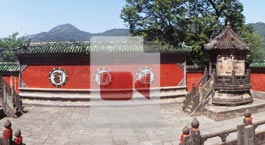The History of Wudang Kung Fu
( chinadaily.com.cn )
Updated: 2012-10-16
Zhang-Sanfeng, the founder of Wudang Internal Boxing, was a famous Wudang Taoist from Wudang Mountain who lived during the transition period between the Yuan and Ming dynasties. It was said that Zhang-Sanfeng, originally named Zhang-Quanyi, nicknamed Sanfeng, was born in Yizhou city, Liaoning province, and was tall and strong, with a tortoise shape and swan bone, big ears and round eyes, a hard beard and moustache. He always wore a coir raincoat and a pair of straw scandals. Whether it was summer or winter, he could live in the lonely and deep mountains or travel in the crowded cities. He could remember what he had read just by one look and talked only about morality, kindness, faith and filial piety. He could talk with the gods and understand Taoism, so he could forecast the future and solve all the difficulties in the world. He could live without a meal for five days, even for two or three months. He could penetrate the mountain and drive stones when he was happy. He lived in the snow when he was tired. He traveled here and there without leaving a trace. All the people at that time were amazed by him and believed him one of the gods.
Wudang Taoist medical cultivation has a long history, especially inner medicine, which consists of cultivating one's breathing to use it as medicine to make one strong and healthy. It also serves as a way to prolong lifespan. Zhang-Sanfeng had a profound cultivation of inner medicine. He said on Taoism, "To cultivate the mood before cultivating the medicine; to cultivate the character before cultivating the good medicine; when the mind is steady, the medicine will come naturally by itself; when the mood and character have been cultivated, good medicine will be in reach." The statement figuratively explained the progress of medicine cultivation. He wrote many books on medicine such as The Gist of Gold Medicine, The Secrecy of Gold Medicine, A Song of Inner Medicine, Twenty-four Principles of Rootless Trees, and Taoist Song of Earth Element and Real Immortal. His work was published during the Ming Dynasty. Later, people compiled them into The Full Collection of Zhang-Sanfeng's Works, consisting of eight volumes.
Zhang-Sanfeng was not only profound in medicine cultivation but also in martial arts, especially boxing and swordplay. He utilized Taoist theories, such as naturalness and humility, and combined Taoist internal exercises, regimen guarding skills, martial arts boxing, and military science into one in order to create Wudang Boxing. The boxing style uses principles of internal exercise, attacking, regimen, self-protection, defeating the tough with the tender, confronting the active with stillness, attack the opponent with his own force, and striking only after the opponent has struck. Since the Ming Dynasty, the martial arts world has viewed Zhang-Sanfeng as the founder of Wudang Inner Boxing and Taiji Boxing. Wudang martial arts, through many generations of succession and development, has become one important school among China’s martial arts, spreading amongst the people with a long and profound influence.
During the beginning years of the Ming Dynasty, Zhang-Sanfeng came to Wudang Mountain to worship Emperor Zhenwu on Heavenly Pillar Peak. He built a hut to the north of Flag-Stretching Peak in which he offered incense to Emperor Zhenwu. He then built a hut in another place, named Meeting Gods Temple. He once said to seniors in the mountain that Wudang Mountain would be different from that day. Later, the second emperor of the Ming Dynasty ordered the large-scale construction of Wudang Mountain. He developed Wudang Mountain into the head of the Five Famous Mountains in China, naming it the Biggest Mountain.
In the 22nd year of Emperor Hongwu of the Ming Dynasty, Zhang-Sanfeng left Wudang Mountain without any information. When the king of Hunan province, Zhu-Bai, worshiped at Wudang Mountain he could not find him. Zhu-Bai then wrote a poem which eulogized Zhang-Sanfeng:
"Zhang-Sanfeng loves gods. He drinks the water from the clean river in the morning and sleeps under South Cliff in the evening. He has cultivated Taoism in Wudang Mountain for many years, paying no attention to the changes of seasons and landscapes. When I could not find him in the bare mountain, how sad I am! There is only an empty hut left, an old Taoist sleeps under the pine tree."
In the 24th year of Emperor Hongwu, Zhu-Yuanzhang, founder of the Ming Dynasty, sent profound Taoists to organize all Taoism in China. Zhang-Sanfeng became famous for this reason. Zhu specially ordered that "if you meet Zhang-Sanfeng, invite him to me." But no one could find Zhang-Sanfeng.
When Zhu-Li became emperor of the Ming Dynasty, he wanted to invite Zhang-Sanfeng, who at that point was famous and highly influential, to work in the central government. He sent many men to look for him many times, but all ended in failure. He himself wrote a letter to Zhang-Sanfeng, which stated:
"A letter from the Emperor to Zhang-Sanfeng: I admire you so much that I want to learn from you. I have tried sending men to look for you all over the country, but you are a profound god, full of wonder and mystery, so I couldn't find you. Though I am not so clever and special, I look forward to meeting you day and night. So I send envoys again to look for you with my letter, waiting for your coming, so as to express my faithful feelings to you. On February 2, the tenth year of Emperor Yongle."
From the letter, we can understand his anxiety and admiration to meet Zhang Sanfeng. He had looked for him many times, but never found him. Emperor Zhu-Li ordered the construction of Meeting God Palace and a copper statue for Zhang Sanfeng and sent officials to clean the palace. Zhang Sanfeng was the only Wudang Taoist in history to be honored with a temple, statue and incense offerings by the highest emperor in China.



